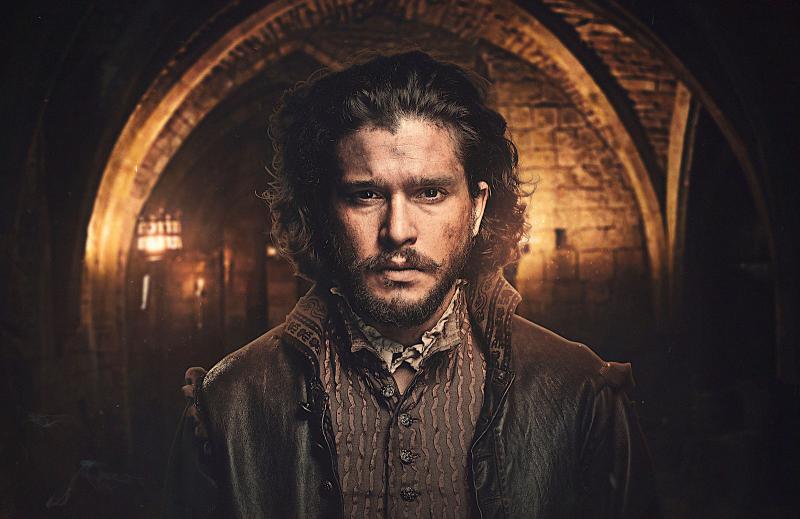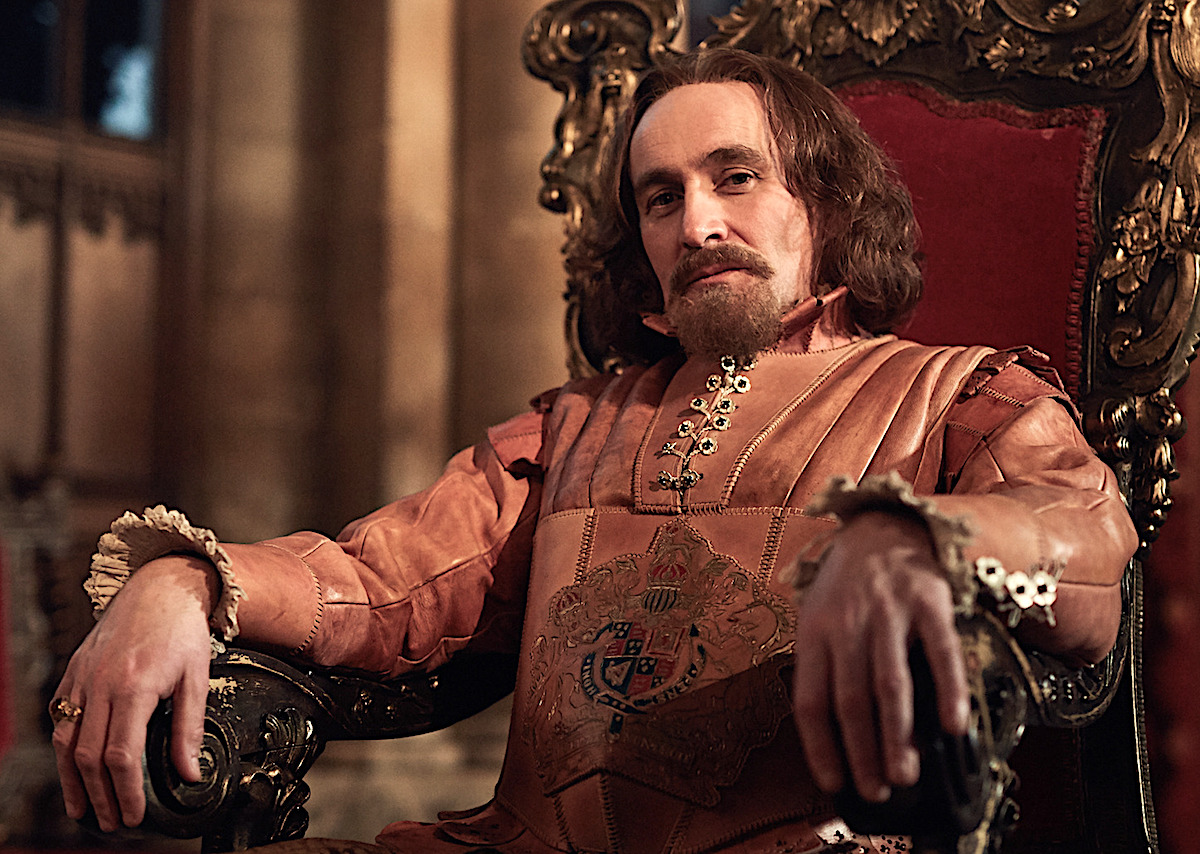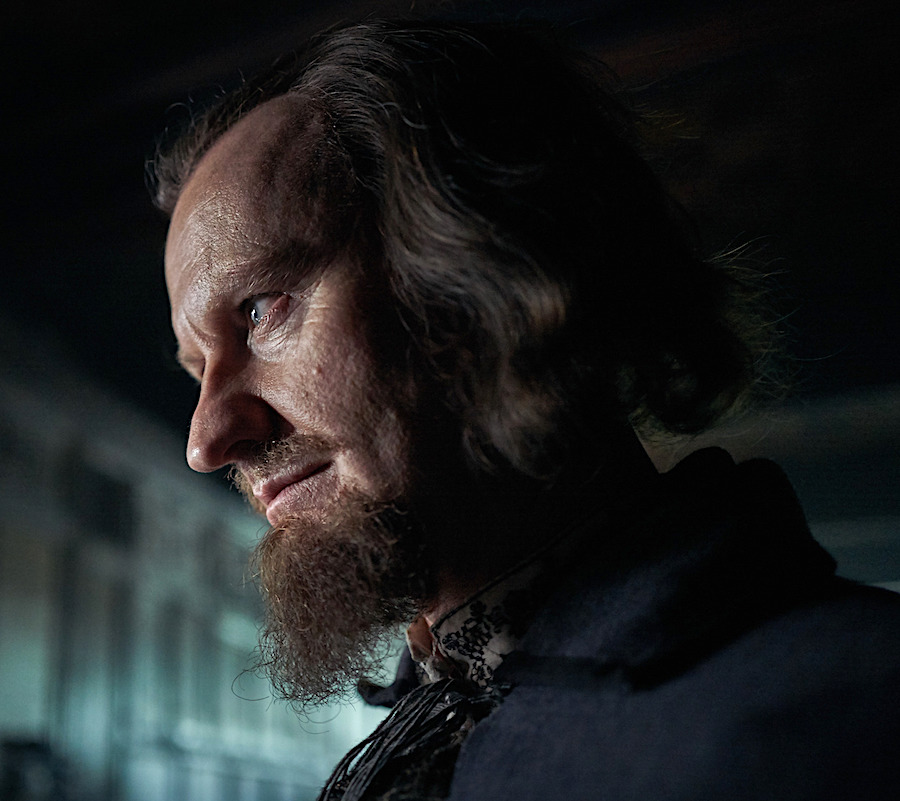Gunpowder, BBC One review – death, horror, treason and a hint of farce | reviews, news & interviews
Gunpowder, BBC One review – death, horror, treason and a hint of farce
Gunpowder, BBC One review – death, horror, treason and a hint of farce
Dark and Gothicky treatment of the plot to blow up Parliament

Much is being made of the fact that Kit Harington is not only playing the Gunpowder Plot mastermind Robert Catesby, but is genuinely descended from him (and his middle name is Catesby).
This first of three episodes (on BBC One, but all are now available on iPlayer) was broody, dark and menacing, history recycled into a Gothicky netherworld. Westminster, 1603 style, was portrayed as a stygian pile on the bank of the Thames where no daylight could apparently reach, reminiscent of the cityscapes of Tom Hardy’s Taboo. Plots were hatched in claustrophobic rooms, messages were to be conveyed via secret cyphers written in invisible ink, and no one could be trusted. A visit to Brussels, where rebellious Papists were scheming to overthrow England’s new Protestant (though Scottish) King James I, was like descending into a giant sewer (Derek Riddell as James I, pictured below). It’s normally Guy Fawkes who springs to mind as the gunpowder guy, but he only appeared briefly here, played by Tom Cullen as a bearded, shaven-headed killer. Instead, Bennett and director J Blakeson set about showing us why Catesby, who had form as a Catholic conspirator and had been hit with a huge fine for his part in the Essex Rebellion of 1601, felt driven to try to put a bomb under James I and his Parliament. In an agonisingly long but skilfully sustained opening sequence, we observed the sneering and ruthless Sir William Wade (Shaun Dooley) conducting a forensic search of a Warwickshire mansion where, he correctly suspected, Catholics had been gathering for an illicit mass conducted by Father Henry Garnet (Peter Mullan). The very air, as Wade put it, was “rancid with Popery”. The upshot was that the lady of the house, Lady Dorothy Dibdale, and a young priest were carted away to captivity while Catesby himself could only look on, raging helplessly.
It’s normally Guy Fawkes who springs to mind as the gunpowder guy, but he only appeared briefly here, played by Tom Cullen as a bearded, shaven-headed killer. Instead, Bennett and director J Blakeson set about showing us why Catesby, who had form as a Catholic conspirator and had been hit with a huge fine for his part in the Essex Rebellion of 1601, felt driven to try to put a bomb under James I and his Parliament. In an agonisingly long but skilfully sustained opening sequence, we observed the sneering and ruthless Sir William Wade (Shaun Dooley) conducting a forensic search of a Warwickshire mansion where, he correctly suspected, Catholics had been gathering for an illicit mass conducted by Father Henry Garnet (Peter Mullan). The very air, as Wade put it, was “rancid with Popery”. The upshot was that the lady of the house, Lady Dorothy Dibdale, and a young priest were carted away to captivity while Catesby himself could only look on, raging helplessly.
 The fate of the arrestees is likely to linger in the minds of viewers, since they were subjected to a pair of the most hideous executions ever staged on the telly. The priest was ghoulishly hanged, drawn and quartered, while Lady Dorothy was stripped naked and crushed to death by huge weights. Whether all this really happened isn’t clear, but Bennett has used these horrors to fuel Catesby’s lust for vengeance against the king and his failure to curb anti-Catholic persecution.
The fate of the arrestees is likely to linger in the minds of viewers, since they were subjected to a pair of the most hideous executions ever staged on the telly. The priest was ghoulishly hanged, drawn and quartered, while Lady Dorothy was stripped naked and crushed to death by huge weights. Whether all this really happened isn’t clear, but Bennett has used these horrors to fuel Catesby’s lust for vengeance against the king and his failure to curb anti-Catholic persecution.
Harington's Catesby is a desperate man driven by a glowing core of anger and loathing, but there was at least a little light relief from Mark Gatiss (pictured above), who played the hunchbacked Lord Robert Cecil, the éminence grise of Britain’s nascent secret service, with an air of louche sadism, skating perilously along the perimeter of farce. Nor was it possible to accuse James I of an excess of royal gravitas, since he was played by Derek Riddell as an effete, tittering ninny, surrounded by foppish sycophants. When he chastised Cecil by telling him that “must is not a word that can be used to princes”, we were in the heart of Blackadder-land. Neverthess, you were left wanting to watch the rest of it.
rating
Explore topics
Share this article
Add comment
The future of Arts Journalism
You can stop theartsdesk.com closing!
We urgently need financing to survive. Our fundraising drive has thus far raised £49,000 but we need to reach £100,000 or we will be forced to close. Please contribute here: https://gofund.me/c3f6033d
And if you can forward this information to anyone who might assist, we’d be grateful.

Subscribe to theartsdesk.com
Thank you for continuing to read our work on theartsdesk.com. For unlimited access to every article in its entirety, including our archive of more than 15,000 pieces, we're asking for £5 per month or £40 per year. We feel it's a very good deal, and hope you do too.
To take a subscription now simply click here.
And if you're looking for that extra gift for a friend or family member, why not treat them to a theartsdesk.com gift subscription?
more TV
 Mr Scorsese, Apple TV review - perfectly pitched documentary series with fascinating insights
Rebecca Miller musters a stellar roster of articulate talking heads for this thorough portrait
Mr Scorsese, Apple TV review - perfectly pitched documentary series with fascinating insights
Rebecca Miller musters a stellar roster of articulate talking heads for this thorough portrait
 Down Cemetery Road, Apple TV review - wit, grit and a twisty plot, plus Emma Thompson on top form
Mick Herron's female private investigator gets a stellar adaptation
Down Cemetery Road, Apple TV review - wit, grit and a twisty plot, plus Emma Thompson on top form
Mick Herron's female private investigator gets a stellar adaptation
 theartsdesk Q&A: director Stefano Sollima on the relevance of true crime story 'The Monster of Florence'
The director of hit TV series 'Gomorrah' examines another dark dimension of Italian culture
theartsdesk Q&A: director Stefano Sollima on the relevance of true crime story 'The Monster of Florence'
The director of hit TV series 'Gomorrah' examines another dark dimension of Italian culture
 The Monster of Florence, Netflix review - dramatisation of notorious Italian serial killer mystery
Director Stefano Sollima's four-parter makes gruelling viewing
The Monster of Florence, Netflix review - dramatisation of notorious Italian serial killer mystery
Director Stefano Sollima's four-parter makes gruelling viewing
 The Diplomat, Season 3, Netflix review - Ambassador Kate Wyler becomes America's Second Lady
Soapy transatlantic political drama keeps the Special Relationship alive
The Diplomat, Season 3, Netflix review - Ambassador Kate Wyler becomes America's Second Lady
Soapy transatlantic political drama keeps the Special Relationship alive
 The Perfect Neighbor, Netflix review - Florida found-footage documentary is a harrowing watch
Sundance winner chronicles a death that should have been prevented
The Perfect Neighbor, Netflix review - Florida found-footage documentary is a harrowing watch
Sundance winner chronicles a death that should have been prevented
 Murder Before Evensong, Acorn TV review - death comes to the picturesque village of Champton
The Rev Richard Coles's sleuthing cleric hits the screen
Murder Before Evensong, Acorn TV review - death comes to the picturesque village of Champton
The Rev Richard Coles's sleuthing cleric hits the screen
 Black Rabbit, Netflix review - grime and punishment in New York City
Jude Law and Jason Bateman tread the thin line between love and hate
Black Rabbit, Netflix review - grime and punishment in New York City
Jude Law and Jason Bateman tread the thin line between love and hate
 The Hack, ITV review - plodding anatomy of twin UK scandals
Jack Thorne's skill can't disguise the bagginess of his double-headed material
The Hack, ITV review - plodding anatomy of twin UK scandals
Jack Thorne's skill can't disguise the bagginess of his double-headed material
 Slow Horses, Series 5, Apple TV+ review - terror, trauma and impeccable comic timing
Jackson Lamb's band of MI5 misfits continues to fascinate and amuse
Slow Horses, Series 5, Apple TV+ review - terror, trauma and impeccable comic timing
Jackson Lamb's band of MI5 misfits continues to fascinate and amuse
 Coldwater, ITV1 review - horror and black comedy in the Highlands
Superb cast lights up David Ireland's cunning thriller
Coldwater, ITV1 review - horror and black comedy in the Highlands
Superb cast lights up David Ireland's cunning thriller
 Blu-ray: The Sweeney - Series One
Influential and entertaining 1970s police drama, handsomely restored
Blu-ray: The Sweeney - Series One
Influential and entertaining 1970s police drama, handsomely restored

Comments
The quotation attributed to
A good point well made,
Catholic priests, if caught,